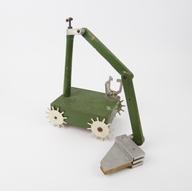

















BOLT, two legged, four winged running and flying robot, designed and made by Kevin Peterson, in the Biomimetic Millisystems Lab at the University of California, Berkeley, California USA, 2011
One of the major drivers for current robotics research is biomimicry, the creation of cybernetic structures informed by the physiology of creatures, both human, on land, at sea, and in the air. Beyond the ‘gross anatomy’ of creatures – the bones, organs, joints, etc, there is a growing realisation that intelligence I animal structures is not conveyed simply by the mind/brain, but ‘embodied’ in the rest of the being: exploring this is leading to very complex analyses of natural forms, how they evolved, how they can be improved upon, and how we can exploit them in new and innovative ways.
DASH, for example, reflected that our analysis of the evolution of avian flight is based on incomplete fossil records and theoretical modelling to fill the gaps: DASH lent credence to the theory, based on practical experiments, that flight evolved from tree-dwelling gliding birds, rather than those having to make a take-off from the ground, which required much more effort. This data in turn helps build a wider picture of how flight works – and might work in future – supporting efforts to refine new, small-scale flight technologies.




